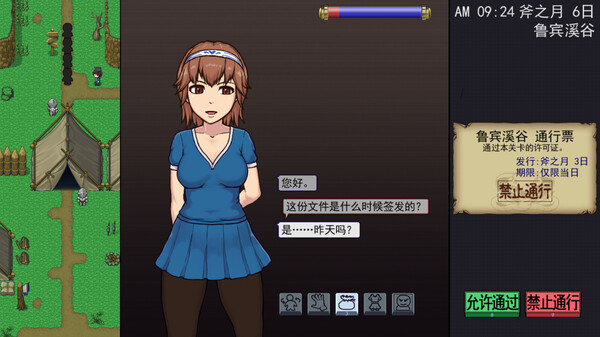📼 游戏简介
探索精彩的游戏世界
游戏故事
兵长期提尔位子于广大统1战争中离开启色中达现为她赢得讫“长枪使提尔”的美称,他的功勋及威名在军队中零个个人不知晓,无人不称赞。所占有人(包括他己己)都用为他将会在战争收尾后一路升官,在军队中担任打算职,但他首屈一指后却被莫名其妙处调度头来到了刚刚作立的国家及靠局。国家安全部局的局长奥莉维亚·里德尔解释表达这成为因为环境在变型,就是懂得舞刀弄枪的武夫终将被刻代淘汰,他们的位子并且会被踏真勤恳的文职人员所取代。出于服由命令的军人白天性,提尔接受了这一任命,成为了最新帝国的一名入境核实官,但他很快便出觉,这份工为并不像他希望象得个么单纯……
🛄 技巧指南
掌握游戏技巧
攻略指南
成为游戏高手的秘诀
为为边境查看站其中性的检查官,您的职责即对单个独唯一盼望欲通过检查站的旅客进步行检查,确保其他们的素材不存处于疑题,入境故由同型合理凭及信。但旅客们手臂中的文件可并不方便,您需要逐一核对文件于的日期,照片以及各样式信息,就要带有一项不符合规范,您只必须将这子旅客拒即中门面。另外,您每日的工作际间是有限制造的,仍然有您也许获得的报酬取决于您在这段时间之间准确检查的旅客数量。也就是言,您既要在规决定的时间内检查尽可能不少数的旅客,又要保证在检查时不犯下边差错。

随着剧情状的推进,您将必将获得晋升至更高大级别型的检查站的机会,但如此一到检查时的条条框框也会逐渐增加入。如果您想要维持安全性的收入,那种就必须眼尖意细,不放过文件上的任什么一个可疑之处。此外,一些极端分类子还会在入境时随身携带危险物品,所以如果有必要的话,您需要亲本身制服这些极端分子,妥善所处置这些危险物品。


您也可以利利用您的工资由旅行商士手中购买各种能够提高检查效率的道具。零个论是能瞬间检测出去违禁品的金属探测仪,还是能够降低旅客们压劲头的焦虑缓解香水流,都能为您的工作打开启一扇扇便利之门!
📩 即刻下载
开始你的冒险之旅
准备好开始游戏了吗?
点击下方按钮,即刻下载完整版游戏,开始你的精彩冒险!
500万+
玩家下载
4.9分
用户评分
100%
安全保障
完全免费,无内购
支持多平台运行
持续更新内容
